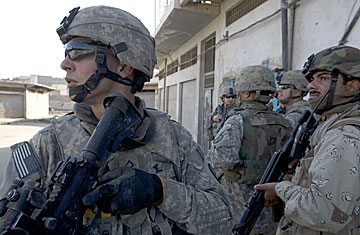
U.S. and Iraqi troops patrol in Mosul, February 2008
Iraqi Prime Minister Nouri al-Maliki has vowed to wage a "decisive battle" against insurgents in Mosul, which U.S. and Iraqi officials say is their last urban haven. But U.S. forces trying to stamp out insurgent networks in that city lack a major boon the surge effort has had elsewhere in Iraq over the past year: Local volunteer fighters.
Col. Michael Bills, the commander for U.S. forces in Mosul, has ruled out using so-called Concerned Local Citizens (CLC), bands of irregulars working alongside American and Iraqi troops in parts of Baghdad, Anbar Province and other areas of Iraq. "You got such a melting pot it's difficult to even fathom trying to do a CLC up here," Bills said of the Mosul area, where the population is complex mix of Iraq's ethnic and sectarian groups. The territory around Mosul has long been home to Kurds, Sunnis, Christians, Shi'ites, Yazidis and Turkmens. Bills fears any efforts to organize volunteer fighters to set against insurgents could backfire, igniting tensions among the disparate communities. "What ethnic group do you go after?" Bills said. "You just can't start something like that, because I think tensions will start between different CLC groups."
The absence in Mosul of local volunteers, who are typically paid about $300 per month by U.S. forces elsewhere in Iraq, means American troops have more difficulty finding insurgents in the population. One of the most valuable things such fighters brought to the table over the past year across Iraq is a knowledge of who exactly the insurgents in their areas were. U.S. military officials estimate that roughly 300 hard-core fighters operate in Mosul, chiefly on the predominately Sunnni west side of the city. Attacks there are 50% higher than elsewhere in Mosul, according to Lt. Col. Michael Simmering, a commander at the main U.S. outpost in Mosul, Forward Operating Base Marez. But so far U.S. and Iraqi forces have failed to rein in the fighters, who stage daily attacks around the city. "The insurgents do have the ability to move around the city freely," said Simmering.
U.S. officials are hoping Iraqi security forces are able to accomplish on their own what volunteer fighters have against the insurgency in places like Anbar Province, where a confederation of tribesmen turned against al-Qaeda in Iraq and began fighting alongside U.S. troops. An estimated 9,000 Iraqi army troops are in Mosul working with some 1,400 American soldiers. Additionally, about 9,000 Iraqi police are in the city as well. But so far Iraqi security forces have yet to make a significant display of force in Mosul.
Iraqi Defense Minister Abdel Qader Jassim Mohammed recently visited the city recently and expressed concern that Iraqi security forces were disorganized and abandoning the streets at night. U.S. troops continue to work with Iraqi security forces to establish jointly manned checkpoints and outposts in Mosul. U.S. troops are also helping Iraqi army and police to chase down insurgents with regular raids around the city. But few American soldiers feel a major offensive by the Iraqis on Mosul is imminent. Most are preparing for a long campaign that may not bring visible gains until the summer. "This is going to happen over a period of months," Simmering said.
